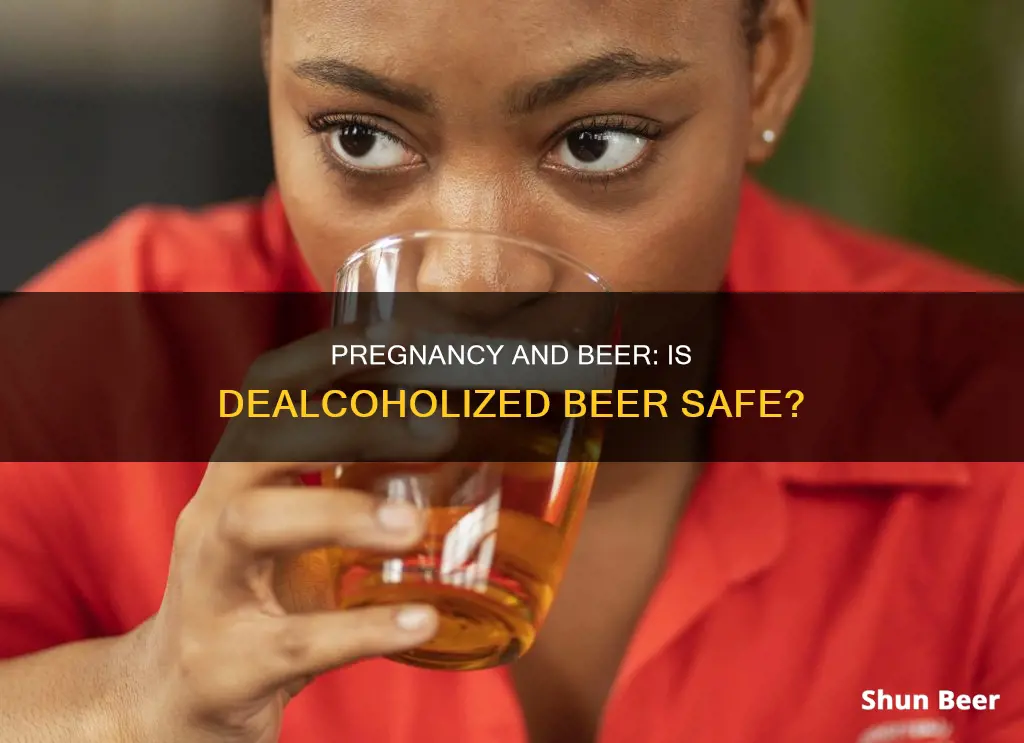
Drinking alcohol during pregnancy can lead to fetal alcohol spectrum disorder (FASD), which can cause problems with learning, behaviour, joints, bones, muscles, organs, managing emotions, and developing social skills. As such, the American College of Obstetrics and Gynecology (ACOG) says that no amount of alcohol during pregnancy is considered safe. However, some women still opt for non-alcoholic or low-alcoholic beverages, believing them to be a safer alternative. But are they?
| Characteristics | Values |
|---|---|
| Alcohol content | Non-alcoholic beer can contain up to 0.5% alcohol by volume (ABV). |
| Safety | There is limited research on the safety of non-alcoholic beer during pregnancy. The American College of Obstetrics and Gynecology (ACOG) states that no amount of alcohol during pregnancy is considered safe. However, some research suggests that light drinking during early pregnancy may not have negative effects. |
| Risks | Drinking alcohol during pregnancy can increase the risk of miscarriage, premature birth, low birth weight, and fetal alcohol spectrum disorder (FASD). |
| Alternative options | Alcohol-free drinks contain zero detectable alcohol and are generally made with fruit juice or soda water. |
What You'll Learn
- De-alcoholized beer may still contain alcohol
- No safe level of alcohol intake during pregnancy is known
- Alcohol consumption during pregnancy is linked to fetal alcohol spectrum disorder
- Non-alcoholic beer may contain more alcohol than what is indicated on the label
- Experts recommend abstinence from alcohol during pregnancy

De-alcoholized beer may still contain alcohol
The effects of drinking alcohol during pregnancy can be severe and include an increased risk of miscarriage, premature birth, and low birth weight. Alcohol consumption during pregnancy can also cause the baby to develop fetal alcohol spectrum disorder (FASD), which can lead to problems with learning, behaviour, joints, bones, muscles, organs, managing emotions, and developing social skills.
To eliminate any risk of FASD, it is recommended that pregnant women abstain from consuming any drinks labelled "non-alcoholic" and instead opt for drinks labelled "alcohol-free", which by law must contain no traceable alcohol. However, it is always best to check the label to ensure that the drink contains 0.0% alcohol by volume.
It is worth noting that naturally occurring alcohol is present in everyday food and drink items, such as fruit juice and ripe bananas. However, the amount of alcohol in these items is generally less than that found in non-alcoholic beer.
Ultimately, the decision to consume non-alcoholic beer during pregnancy should be made in consultation with a healthcare professional. They can provide personalized advice and guidance based on an individual's specific circumstances.
The Magic Inside Beer Cartridges: How Do They Work?
You may want to see also

No safe level of alcohol intake during pregnancy is known
Drinking alcohol during pregnancy can have serious consequences for the baby's development. Alcohol is a known teratogen, which means it can interfere with the healthy development of a foetus and cause brain and birth defects. The more a pregnant person drinks, the greater the risk to the baby.
Fetal Alcohol Spectrum Disorder (FASD) is a serious life-long condition that can develop in babies exposed to alcohol in the womb. FASD can cause a range of issues, including problems with learning and behaviour, joints, bones, muscles, and organs, managing emotions and developing social skills, hyperactivity, and communication. The risk of FASD is greater the more alcohol is consumed.
Some research suggests that light drinking during early pregnancy may not have negative effects. However, there is no clear guideline on how much alcohol is considered safe, and the line between "light" and "moderate" drinking is vague. As a result, experts generally recommend that no amount of alcohol be consumed during pregnancy.
Non-alcoholic beverages, including beer, can still contain trace amounts of alcohol, up to 0.5% alcohol by volume (ABV). In some cases, these beverages may contain higher levels of alcohol than indicated on their labels. A 2010 study found that 29% of "no or low alcohol" beverages had higher ethanol levels than declared, with some containing up to 1.8% ABV. Therefore, even non-alcoholic drinks may pose a risk to the developing foetus, and complete abstinence from these beverages during pregnancy is recommended.
While it may be challenging to avoid alcohol entirely during pregnancy, it is important to minimise any potential risk to the baby. It is always better to be safe than sorry when it comes to the health of the baby. Pregnant individuals should consult with their healthcare provider if they have any questions or concerns about their alcohol consumption.
Beer and Rosacea: What's the Connection?
You may want to see also

Alcohol consumption during pregnancy is linked to fetal alcohol spectrum disorder
FASD is an umbrella term for a group of conditions that can occur when a mother consumes alcohol during pregnancy. It includes fetal alcohol syndrome (FAS), which is the most severe form of the disorder and can result in fetal death, abnormal facial features, growth problems, and central nervous system issues. Children with FAS may also experience learning difficulties. Other conditions within the FASD spectrum include alcohol-related neurodevelopmental disorder (ARND) and alcohol-related birth defects (ARBD). ARND can cause learning and behavioral problems, while ARBD can lead to abnormalities in the heart, kidneys, bones, and hearing.
The effects of alcohol consumption during pregnancy can vary depending on the amount consumed, the timing of exposure during pregnancy, and other factors such as genetic susceptibility. However, there is no known safe threshold for alcohol intake during pregnancy. Even light or moderate drinking can affect the developing fetus, and binge drinking during pregnancy further increases the chances of FASD. Therefore, complete abstinence from alcohol is recommended to eliminate any risk of FASD.
The diagnosis of FASD can be challenging due to the lack of a biological test, and it is often based on evaluating abnormal facial features, growth problems, central nervous system abnormalities, and prenatal alcohol exposure. Early intervention services, such as medications, behavior and education therapy, and parent training, can improve a child's development and mitigate the adverse effects of FASD. However, FASD is irreversible, and there is currently no cure.
Beer and Prilosec: Safe Mix or Health Risk?
You may want to see also

Non-alcoholic beer may contain more alcohol than what is indicated on the label
Non-alcoholic beer is often viewed as a safe alternative to alcoholic drinks, and it can be tempting to reach for one during pregnancy. However, it's important to be aware that non-alcoholic beers may contain more alcohol than advertised, which poses risks to the developing fetus.
Legally, non-alcoholic beers can contain up to 0.5% alcohol by volume (ABV). However, research suggests that many of these beverages contain more alcohol than their labels indicate. A study published in the Canadian Journal of Clinical Pharmacology in 2010 found that 29% of no- or low-alcohol beers tested had higher ethanol levels than declared on their labels. Six beverages marketed as having 0% alcohol actually had more than 1% ethanol, with some containing up to 1.8% ABV. This discrepancy was also noted in a 2019 study, which found that 30% of non-alcoholic beers tested had more alcohol by volume than stated on their labels.
The Motherisk Team at the Hospital for Sick Children in Toronto, Canada, also highlights this issue. They state that non-alcoholic beverages might contain higher ethanol levels than indicated and recommend abstinence from these drinks during pregnancy to eliminate any risk of fetal alcohol spectrum disorder (FASD). FASD can cause a range of problems, including facial abnormalities, growth retardation, and neurodevelopmental disorders.
The American College of Obstetrics and Gynecology (ACOG) and the Centers for Disease Control and Prevention (CDC) both assert that there is no known safe amount of alcohol use during pregnancy. Drinking alcohol during pregnancy can lead to FASD and other adverse outcomes, such as low birth weight, premature birth, and miscarriage.
Given the potential risks, it is generally recommended that pregnant individuals abstain from consuming non-alcoholic beers, as these products may still contain unsafe amounts of alcohol. While the research is limited, it is better to err on the side of caution when it comes to the health of the developing fetus.
Enjoying Beer While Watching Champions League Games
You may want to see also

Experts recommend abstinence from alcohol during pregnancy
Pregnant women or those planning to become pregnant should refrain from consuming alcohol, as per expert recommendations. This is because alcohol consumption during pregnancy can have detrimental effects on the developing foetus, leading to potential physical, cognitive, and behavioural complications. The more alcohol is consumed, the higher the risk to the unborn baby.
Alcohol passes through the placenta to the baby, who is unable to process it effectively due to an underdeveloped liver. This can result in an increased risk of miscarriage, premature birth, and low birth weight. Additionally, drinking during pregnancy elevates the chances of the baby developing fetal alcohol spectrum disorder (FASD), which encompasses a range of issues, including learning and behavioural difficulties, problems with certain organs, impaired emotional management, and communication challenges.
To ensure the baby's health, it is advisable to avoid alcohol entirely during pregnancy. This is supported by the fact that there is no known safe threshold for alcohol intake during pregnancy. Even small amounts of alcohol can potentially cause harm to the developing foetus.
Non-alcoholic beverages, including non-alcoholic beer, may not be a safe alternative during pregnancy. Some of these drinks can contain higher ethanol levels than indicated on their labels, and there are currently no studies directly evaluating the safety of consuming these beverages while pregnant. Therefore, complete abstinence from alcohol and non-alcoholic beverages is recommended to eliminate any potential risks to the baby.
While the effects of alcohol on breastfed infants are less certain, it has been shown that ethanol can be detected in breast milk after consuming non-alcoholic beer. To be cautious, it is recommended to briefly delay breastfeeding after consuming such drinks or opt for alcohol-free beverages instead.
Beer and Periods: A Healthy Mix?
You may want to see also
Frequently asked questions
It is recommended that pregnant people avoid drinking alcohol to keep the risks to their baby to a minimum. However, the decision to drink non-alcoholic beer is up to you and your doctor.
Non-alcoholic beer is a beer that contains less than 0.5% alcohol by volume (ABV). This is the uppermost limit that a beverage can contain and still be called "non-alcoholic".
Drinking during pregnancy can cause your baby to develop fetal alcohol spectrum disorder (FASD), which can lead to problems with learning, behaviour, joints, bones, muscles, organs, managing emotions, developing social skills, hyperactivity, impulse control, and communication. It can also increase the risk of miscarriage, premature birth, and low birth weight.
Some alternatives to drinking alcohol during pregnancy include alcohol-free mocktails or drinks labelled "alcohol-free", which by law must contain no traceable alcohol. You can also try making your own non-alcoholic drinks at home, such as mocktails or smoothies.
If you drank alcohol before knowing you were pregnant, don't worry. Any alcohol consumed very early in your pregnancy (before 8 weeks) is likely to not have an effect on the fetus. It's important to stop drinking as soon as you find out you're pregnant and to seek medical advice if you have any concerns.







